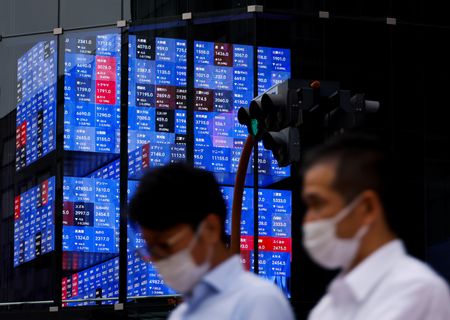 1
1 1
1

(Reuters) – A look at the day ahead in Asian markets from Jamie McGeever
Asia’s corporate and macro calendars are remarkably light on Monday, allowing investors to look squarely toward three regional central bank policy decisions later in the week, and more importantly, Jackson Hole.
Federal Reserve Chair Jerome Powell will deliver his keynote address at the Kansas City Fed’s two-day annual economic symposium at the Wyoming retreat on Friday. His highly anticipated speech on the economic outlook could signal how high U.S. borrowing costs may go and how long they will need to stay there to bring down soaring inflation.
U.S. rates market pricing has the Fed raising rates to a peak around 3.65% early next year, little changed over the past fortnight. But traders have trimmed the amount of rate cuts they expect between March and December next year to 40 basis points from 60 bps.
That said, some Fed officials recently have highlighted the dangers of raising rates too aggressively. Will Powell nod to the threat to growth from higher rates, or lean on the more customary inflation-busting rhetoric?
(Graphic: U.S. implied interest rates – SOFR contracts: https://fingfx.thomsonreuters.com/gfx/mkt/zjvqkbgyrvx/SOFR-Implied.png)
In Asia, monetary policy is far less hawkish. The central banks of China, South Korea and Indonesia meet this week and only one, the Bank of Korea, is expected to raise rates.
The People’s Bank of China is expected to lower its one-year loan prime rate by 10 bps to 3.60% on Monday, and its five-year rate by a bigger margin, as it battles to support a teetering property market and Covid-ravaged economy.
The BOK should raise borrowing costs by 25 bps to 2.50% on Thursday, with inflation still above target, and it is a close call whether Bank Indonesia stays on hold at 3.50% or hikes by a quarter point.
Important as these decisions are, all eyes are on Powell in Jackson Hole on Friday.
(Reporting by Jamie McGeever in Orlando, Florida; Editing by Deepa Babington)